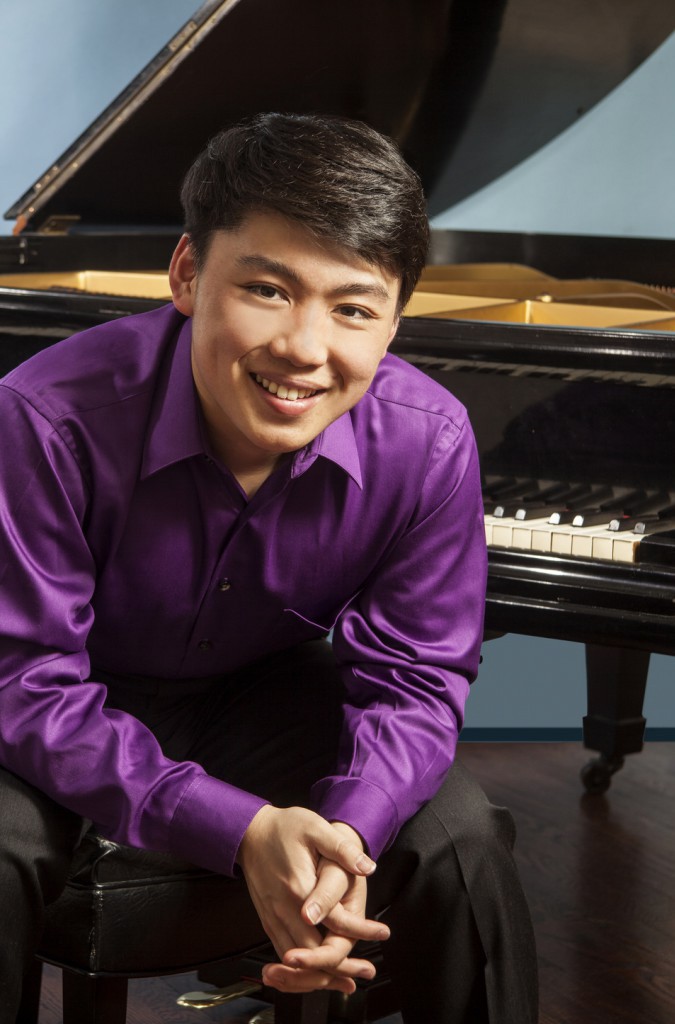George Li lights up Tchaikovsky with Boston Philharmonic Youth Orchestra

George Li performed Tchaikovsky’s Piano Concerto No. 1 with Benjamin Zander and the Boston Philharmonic Youth Orchestra Sunday at Symphony Hall. Photo: Christian Steiner
Two summers ago, all Boston eyes were on a hometown boy who took the stage for the International Tchaikovsky Competition. At 19, George Li was already established in Boston circles as a fine solo pianist. But when he performed Tchaikovsky’s Piano Concerto No. 1 as part of the competition, listeners who were tuned in to the livestream witnessed playing of spectacular technique and power. The judges seemed to agree, awarding him the silver medal in a tie with Russian-Lithuanian pianist Lukas Geniušas.
Li’s star has been ascending since then, and his blossoming career has lately seen him appear as soloist with the Los Angeles Philharmonic and San Francisco Symphony, among other ensembles.
But the now 22-year-old musician keeps ties close to home. Sunday afternoon at Symphony Hall he received a warm hometown welcome when he performed the same Tchaikovsky concerto with the Boston Philharmonic Youth Orchestra, led by Benjamin Zander.
Like many child prodigies who have grown into mature artists, Li possesses a mesmerizing technique. The blazing octave runs that pepper the final movement of the work had equal parts precision and weight.
Li also kept an eye towards the work’s wide expressive range and shaped the phrases with tasteful dynamic shading. The quick, dotted-rhythm runs of the first movement skipped gracefully, and elsewhere Li’s generous rubato playing resulted in supple phrases. In the third movement, the pianist built the lilting theme to dramatic heights.
But Li’s performance showed a mind well attuned to the lyrical nuances of the score. The soft melodic themes of the first movement sounded with a poetic touch. Li also rendered with a chamber-like delicacy his trickling passages that supported a silvery flute solo. Zander’s accompaniment was similarly sensitive as the conductor conjured well-balanced and richly lyrical playing from the orchestra.
Li’s encore, Gluck’s Melodie in D minor, brought an additional radiant moment.
In the rest of the program, the full powers of the Boston Philharmonic Youth Orchestra were on display.
Strong in all sections, this young ensemble performs with fine attention to the musical phrase and an ensemble sound that outshines most mid-level professional orchestras. Brasses were bold and powerful, and the winds and strings were capable of shading lines with varying degrees of darkness and light.
Colors were aplenty in Prokofiev’s Romeo and Juliet. Sunday’s performance combined the composer’s two suites from the ballet in order to convey the complete story of Shakespeare’s famous tragedy. The opening unfolded in a bristly cluster chord that set the air spinning with surging intensity, as if to set the stage for the drama to come.
The solo playing from orchestra members was superb throughout. Flutes captured Juliet’s tender innocence, Christopher Forbes’ saxophone added a splash of color when called upon, and Elmer Churampi’s trumpet gleamed brilliantly in the “Folk Dance.”
The strings performed the familiar melody of the “Capulet Ball” with a stark, death-haunted urgency. “Masks” took off in a impish dance, and the “Balcony Scene” resonated with warmth to capture the palpable emotions of the lover’s meeting. Most dramatic was “The Death of Tybalt,” where the tutti passages fell like hammer strokes.
In the concert’s opener, Wagner’s Tannhäuser Overture, clarinets and trombones rendered the famous theme with a distant yet radiant tone. When the full brass section took over the theme later in the piece, the line swelled in phrases of grandeur.
With the final chords resonating in the hall, it was easy to forget that these players were only at the beginning of what hopes to be stellar careers in music.
Benjamin Zander will lead the Boston Philharmonic Youth Orchestra in Mahler’s Symphony No. 9 at 3 p.m. March 11 at Symphony Hall. bostonphil.org
Posted in Performances




